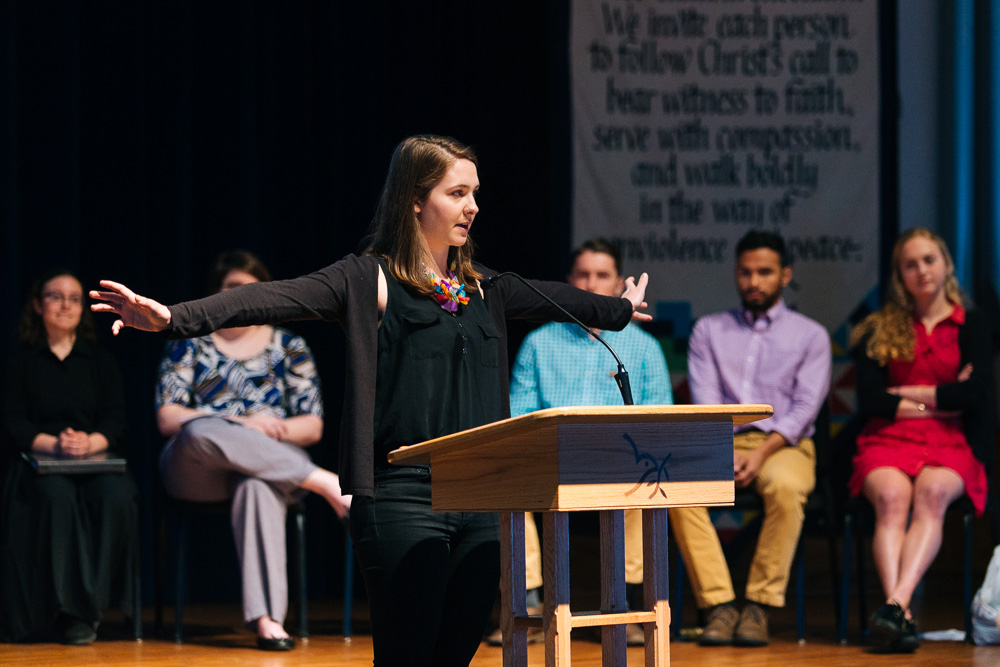Hannah Mack-Boll, a 2017 graduate of Eastern Mennonite University, from Lancaster, Pennsylvania, took second place in the 2017 C. Henry Smith Peace Oratorical Contest administered by Mennonite Central Committee (MCC) U.S.
Mack-Boll’s speech was titled “What is Your Intention?” [Listen to an excerpt of her speech here or read it here.] The speech includes experiences in Strategies for Trauma Awareness and Resilience (STAR) training, as well as listening to survivors of war-related violence in Colombia and that of the EMU community when confronted with sexual violence.
“What do we do when we encounter systems that don’t trust us?” she asks.
Mack-Boll, a peacebuilding and development major at the time, advanced to the national competition after winning the contest held at EMU in the spring 2017 semester. She received $225 in cash and a $200 scholarship to a peace-related conference or seminar of her choice. Her home congregation is Community Mennonite Church of Lancaster.
Jacob Miller, a recent graduate of Bethel College, North Newton, Kansas, won the contest. He was a communications and literary studies major at Bethel at the time of the contest, and now is a graduate student in communications at Kansas State University.
Miller’s speech, “Mennonite’s [sic] Protest of the U.S. National Anthem Lacks Inclusivity of the Black Community: A Call to ‘Lift Every Voice and Sing’” prompts Mennonites to include race in discussions of peace. He also encouraged Mennonites to recognize the violence inherent in nationalist songs, such as “The Star Spangled Banner.”
“On September 1, 2016 San Francisco 49ers quarterback Colin Kaepernick (who is now a free agent) took the knee heard ’round the world to bring light to social injustices facing Black Americans in contemporary times,” Miller wrote in his speech.
In his speech, he says that although some Mennonite educational institutions do not perform the national anthem before sporting events, they’re missing the connection with race.
“Rarely is Mennonites’ opposition to the anthem rooted in the continued violence of unequal systems that disenfranchise the black community,” says Miller.
“The why behind the protest matters,” he says. “So, today we must first, look to how Mennonites decrying the anthem generally glosses over the black community’s history of oppression, and second, reintroduce the official black national anthem that Mennonite institutions should play,” he adds. The anthem he refers to is “Lift Every Voice and Sing,” which is hymn number 579 in Hymnal: A Worship Book.
“Matthew 5:9 says ‘Blessed are the peacemakers,’ but activism without inclusion is not peace; it’s injustice.”
Miller, from Westmoreland, Kansas, received a cash prize of $500 and a $300 scholarship. He came in third in the 2015 contest for his speech, “For the Sake of Peace, Please Remember that Not All Terrorists are Muslim.”
Canadian Mennonite University student Marnie Klassen, from Abbotsford, B.C., came in third with a speech entitled, “Filtering Dispositions: Water Pollution in Canada.”
The C. Henry Smith Peace Oratorical Contest is open to all students of Mennonite and Brethren in Christ colleges in Canada and the U.S. To be considered in this year’s contest, speeches must have applied a peace theme to contemporary concerns.
Directors of the C. Henry Smith Trust established the contest in 1974 in honor of the late C. Henry Smith, a Mennonite historian and professor at Goshen (Ind.) College and Bluffton (Ohio) College (now Bluffton University). Participating colleges host individual campus contests, usually during the spring semester of the academic year. Then the judges choose the top three speeches from the winners of each campus contest.
This year, three judges — Titus Peachey, former MCC U.S. peace coordinator, Lancaster, Pennsylvania; Janna Hunter-Bowman, assistant professor of peace studies and Christian ethics at Anabaptist Mennonite Biblical Seminary, Elkhart, Indiana; and Paul Heidebrecht, director of the Kindred Credit Union Centre for Peace Advancement at Conrad Grebel University College, Waterloo, Ontario — chose the winners.

Yes, yes, Hannah! Well done, you!